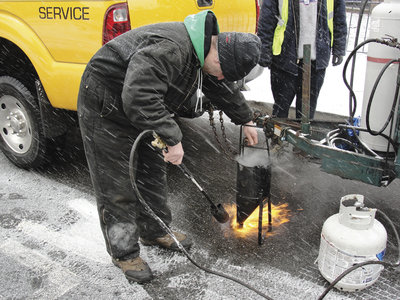“There are a lot of potholes right now,” said Greg Longo, one of a crew working to repair the streets of North Bergen on this snowy winter day. “What happens with potholes is you get the freeze and thaw. You get a crack in the street, water gets underneath, you get the freeze and it actually lifts up the street, cracking the asphalt. Then you get the thaw, and the repeat of that just keeps weakening and weakening the street. And then the salt just degrades the street after a while.”
This winter has been a particularly brutal one for roads, with heavy snows and low temperatures resulting in a multitude of potholes. To combat this, North Bergen instituted a pothole repair hotline for residents to report problems in their neighborhoods. The hotline number is (201) 330-7263.
Once the potholes are logged into a database, the DPW gets to work, sending crews out to survey and then repair the damage.
Filling the holes
Each spring and summer, a comprehensive road repair initiative gets underway in North Bergen. “We mill the existing pothole plus whatever’s around it,” explained Nick Aluotto, another DPW employee. “We have a machine, the Bobcat, and it does them in a square. Let’s say the pothole is this big, we cut around it and we fill everything together. And that lasts for at least two years. But when the weather’s like this, you have to work real fast, because [the patch material] gets hard real quick.”
“We use something they call hot tack,” continued Longo, referring to a thick, tar-like substance also called bitumen. The workers heat the tack with a torch and then use it to line the holes they’re preparing to fill. “It’s actually roofing material. If we have a bunch of holes on the street I can usually go ahead and hot tack about ten holes ahead. As soon as it hits the ground it dries, so you can tack hours ahead of time.”
“This was probably the worst year.” – Nick Aluotto
____________
As a final step, Longo pours hot tack around the edges of the patched asphalt. “We seal the hole, the asphalt, we bond it to the street so it doesn’t come up. A lot of towns basically just put asphalt in it for the time being. We use tack as a bonding agent, as a more permanent fix right away, so the cold weather can’t lift it up, the water can’t get underneath it.”
Patches done this manner tend to last a year or more, according to Aluotto. “And then we come and redo them in the summertime the right way.”
The hot box
To facilitate the process, North Bergen recently purchased a new piece of equipment called an asphalt cooker, or “hot box,” to keep the repair material warm prior to use.
“When we go and get asphalt, we put it in the hot box,” said Aluotto. “You get two tons and it stays a lot warmer so we have more time to work with it.”
Without the hot box, the gradual cooling of the asphalt in the truck results in about a third of each load being wasted. At a cost of $20,000, the hot box is expected to pay for itself this year, and save money in wasted materials going forward.
“People sometimes get mad that we got the road closed, but they have to understand,” said Aluotto. “You want your tire to get damaged? Your rim? Your car? We did 50 [potholes] yesterday, we did 32 on Saturday, Friday we did another 30, and Thursday we did another 40. All over town. Today we’re taking care of downtown. This was probably the worst year. I’ve been here so many years and if you were to see the potholes that we did uptown…” He shook his head.
“This is almost like a family type of crew,” said Aluotto. “We don’t have titles. Before we used to have like lead men and stuff. But what we’re doing now is the whole crew works together. Usually seven guys, sometimes five, it depends. In the summer when we start slowing down we usually have about four because everybody’s going on vacation.”
“I’ve been doing this almost 12 years,” he added. “I enjoy what I do because you you’re always outdoors.”
Potholes reported on the hotline for streets not under North Bergen’s jurisdiction, such as state or county roads, are forwarded to the appropriate agency.
Art Schwartz may be reached at arts@hudsonreporter.com.
